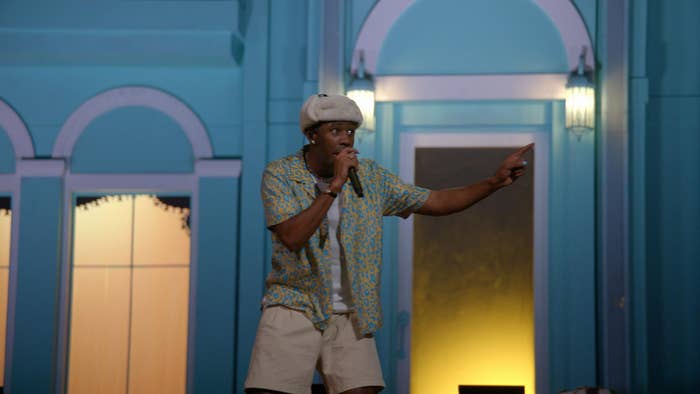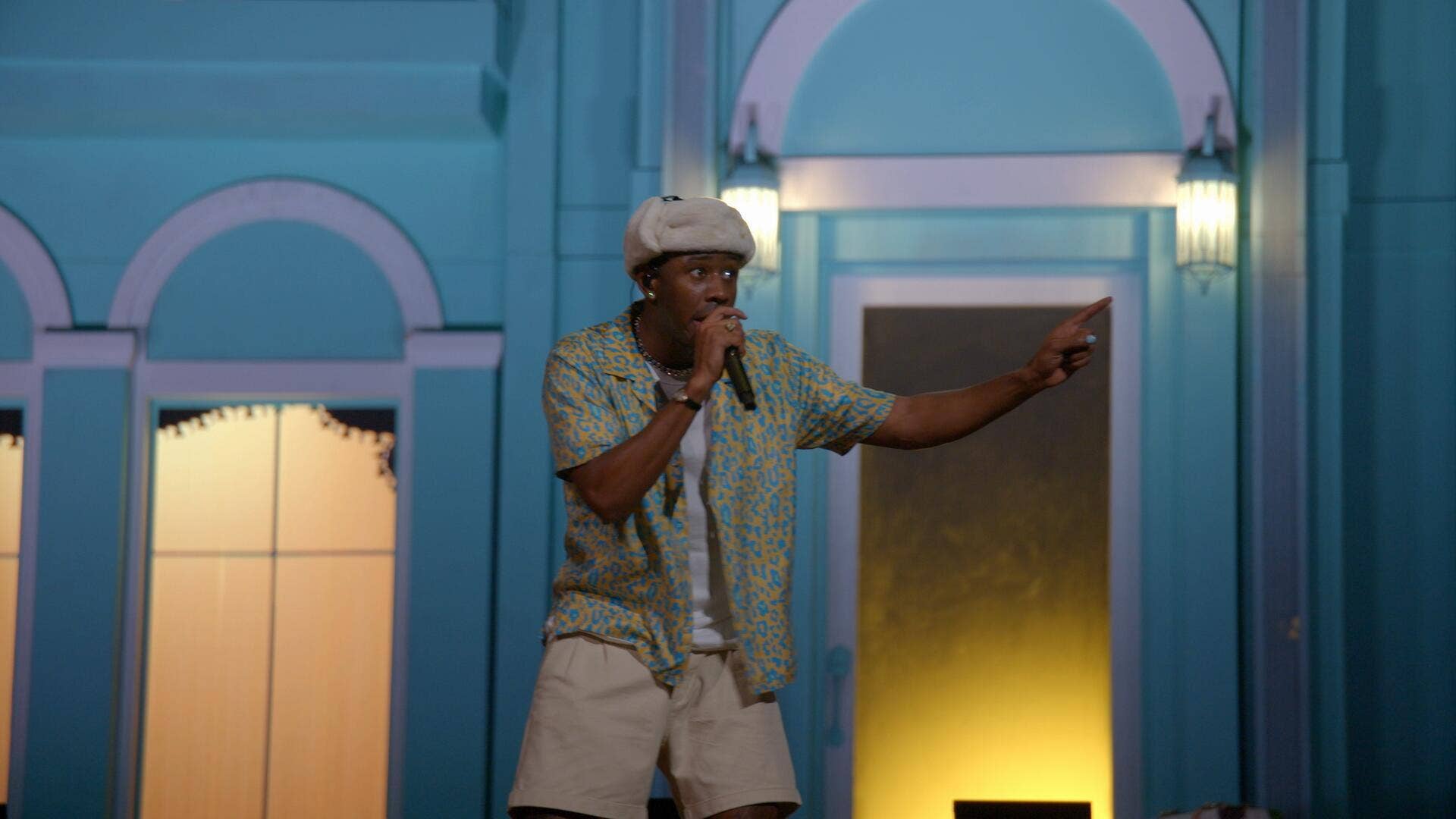
The goal of a documentary is dynamic storytelling. In the past, music documentaries like Hip-Hop Evolution, Fight the Power, and Jeen-yuhs: A Kanye Trilogy have accomplished that goal, leading audiences to ask better questions. Spotify’s RapCaviar Presents docuseries accomplishes that by going past the surface-level analysis of rap as just a youth genre and examining it as a deep reflection of power, progress, and ways Black artists are still regularly left in the wake.
The series has a clear-cut formula for the artists it features: It centers around a societal issue and humanizes the artist experiencing it, whether it be body shaming for Coi Leray or the importance of mental health advocacy for Polo G. The production—spearheaded by executive producer Karam Gill and showrunner Steve Rivo—evidently includes strong moments of research and analysis that get at the core magic of each artist. And that approach is intentional. In a statement released ahead of the show’s premiere, Carl Chery, Spotify’s head of urban music and creative director of the series, wrote that their goal was to use “hip-hop as a vehicle to examine society.” The series, episodically and as a package, works as a quick look under a microscope at the limitations of expression that Black rap artists face in every aspect of their lives.
Hulu and Spotify’s latest miniseries of six episodes, released on March 30 to much discussion, is based around Spotify’s top-performing playlist “RapCaviar” and shows the stars of the show and genre diving into the deep end. Tyler, the Creator discusses how he widened rap’s definitions of what it means to be a male rap star. The City Girls touch on how their power is in their refusal to care about the misogyny of rap’s double standard. Roddy Ricch speaks on his fight to continue building himself in the midst of internet bullying. The artist profiles wrap with Polo G expanding on his natural-born ability to tell stories through rap and poetry in the chaos of losing friends as a youth in Chicago and more.
Days into its release, the series feels like a solid first step to breaking down the fourth wall between artist and consumer as the Spotify team inches closer to more progressive storytelling. Using the voices of journalists, cultural critics, and artists’ teams, the series gets a needed third voice that allows the viewer to see in and outside of the world of celebrity that sheds light on the isolation and criticism every artist exists inside of. The team behind the show makes the case for why building long-term relationships with artists is the best way to build a deep level of trust and support for artists who are used to their stories being manipulated and misunderstood. With expertise from writers such as Danyel Smith, Brooklyn White, Ivie Ani, and Charles Holmes, we get a critical look at how the political and internal realities are seen by those documenting rap culture.
“I’m always on the go. I just go. I don’t know what fear is,” are the words Tyler, the Creator ushers at the top of his RapCaviar episode. He shines brightest as a fully realized figure who has varying sides of his personality and views show in conversation on how the stigma of the hypermasculine rapper hinders the idea of rap stardom. The episode sets the environment for the kind of industry Tyler walked into, starting with Odd Future and showing how the group’s antics began to overshadow the music. It’s great execution. Tyler is finally able to tell his story himself without being understood by the kind of hip-hop media that relies on the very stereotypes the show highlights.
The episode takes Tyler, the Creator seriously as a multi-hyphenate artist who has grown up in the public eye but who has not allowed the vacuum of celebrity to take away his internal voice. We see firsthand how Tyler has evolved in front of our very eyes, because he looked inward to determine his value as an artist and public thinker. “It’s OK to say ‘fuck all that’ and follow your own path,” he says. If you are a kid of the internet, more specifically a kid who grew up on Tumblr, then you saw the rise of OFWGKTA in real time. The episode feels redeeming to see Tyler, now a Grammy award–winning artist, and the legion of brilliant minds of Odd Future finally taken seriously as more than just Black kids looking to cause chaos. They’re shown as generational artists who are still changing the music industry as they blur the lines of gender, sexuality, and sound.
At its weakest, however, the RapCaviar series feels beholden to the constraints of needing to be marketable and easily consumed. In the Roddy Rich episode where the conceptual theme hones in on online bullying, the episode fails to speak to how online culture is a deep reflection of whom the world deems as expendable. However, the production is not fully to blame, as Roddy Rich states that he prides himself on keeping his distance from the mainstream for the sake of his well-being. As a result, we get an episode that spins around the same big questions but never lands anywhere. Without asking the audience to think more strategically about how and why internet culture (specifically Twitter and stan culture) has such an impact on Black culture, the episode falls flat in a series that emphasizes tempo as a means of deepening empathy for its subjects.
“Rappers could fuck around and tell Americans to not pay taxes… That’s what they’re scared of. They aren’t scared of you shooting each other in the street.”
On the other hand, the series is strongest on its “Rhyme and Punishment” episode, where leaving the mold of a singular subject sheds light on the production company’s strengths. By speaking to the political, social, and industry conditions of Black artistry—specifically in the cases of the ongoing YSL trial and incarceration of Bobby Shmurda—we get an interview-focused look at the history of policing black music. It reminds the viewer that nothing under the sun of harmful systems is new or spectacular and brings young folks to the reality that rap stars are not untouchable under a legal system that sees all Black people as second-class citizens. Featuring the voices of Fivio Foreign, Killer Mike, Maino, and Rep. Jamaal Bowman (D-NY), the episode looks at how policing rap is a violation of the First Amendment. “Their only answer is always more police and more jail time… It’s never ending poverty,” says Bowman about how the policing of rap is about controlling Black art instead of keeping the public safe.
The series concludes with news of the New York Senate passing the Rap Act, known as S7527, a law that makes it harder for rap lyrics to be used in criminal trials. While much of the series ends with flighty moments of triumph, the final episode ends with its strongest note to date. As Killer Mike says with clarity, “Rappers could fuck around and tell Americans to not pay taxes… That’s what they’re scared of. They aren’t scared of you shooting each other in the street. They just don’t want you to scare the money off… How much more powerful does that make you as a class of people.”
While the hiccups of the series feel like an issue of formula and catering to an apathetic audience, the Hulu series excels by being well researched and ready to move audiences into the deeper questions of exploitation that are made invisible in rap.


